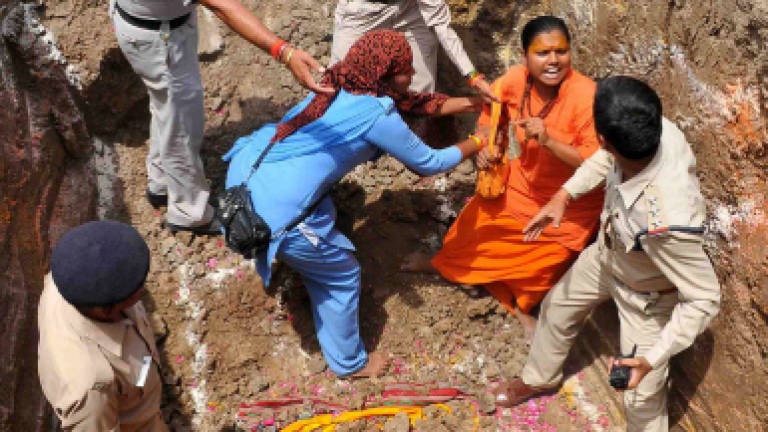Devout Hindu women protest in India after denied holy dip

UJJAIN, India: A group of devout Hindu women began burying their leader alive Tuesday in protest at being denied permission to bathe in holy waters at the Kumbh Mela festival, in the latest battle for gender equality at India's religious sites.
The female "sadhus", or holy women, dug a grave near the River Ganges after which Mahant Trikal Bhavanta, wearing a saffron robe and prayer beads, climbed in to be buried alive.
The protest was triggered after her "Pari Akhara" (Fairy Group) was prevented from taking a ritual dip in the holy waters of the River Ganges on Friday during the festival in central Ujjain city.
Supporters threw fistfuls of dirt and petals on top of Bhavanta, burying her nearly waist-deep before police and district officials intervened.
An akhara is a group of sadhus — reclusive ascetics or wandering monks — who renounce normal life and are widely respected for their holiness. India has more than a dozen such groups, all controlled by men.
Bhavanta has reportedly been facing discrimination since forming her all-women akhara in 2000. Believed to be the first such group in India's Hindu history, it has been criticised by male sadhus who claim it goes against age-old customs.
An AFP photographer at the scene Tuesday said the leader was demanding to be given the same facilities as men during the festival's Shahi Snan, or royal bath, a mass purification ritual.
"If a man can do something, then woman can also do it," she told the Hindustan Times newspaper last week.
"They never want an independent akhara of women. The reason behind this is their male-dominated mentality ... Their view towards women is parochial."
It comes weeks after a Hindu temple in western India lifted a centuries-old ban forbidding female devotees from entering, after a court said women had a fundamental right to worship following impassioned protests by activists.
Bhavanta last week went on an indefinite fast and was admitted to a hospital after her group was denied permission for the dip on grounds that it was not officially recognised by the male-dominated akhara administration.
"We have never asked the administration to recognise us. Just provide us some facilities," she told the English daily.
The Kumbh Mela religious festival is held in Ujjain every 12 years, drawing legions of wandering holy men and women. Similar events are held every three years in other locations around India. — AFP